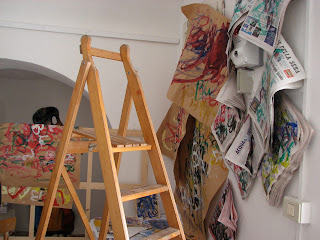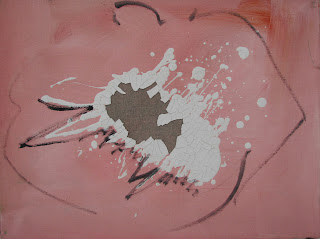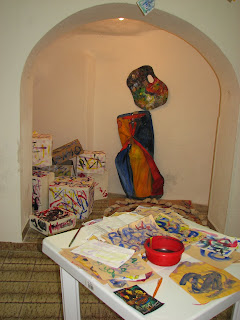Luigi De Giovanni
Quacquaraquà
Artista: Luigi De Giovanni
Titolo della mostra: Quacquaraquà
Spazio espositivo: Sutta Le Capanne du Ripa – Specchia (LE)
Inaugurazione: Sabato 13 luglio 2013 ore 20.00
Date: Dal 13 luglio al 13 agosto 2013
Orario: dalle 10.30 alle 13,00 - dalle 18.00 alle 24
Ingresso libero
Presentazione: Antonietta Fulvio
Allestimento: Arch. Stefania Branca
Coordinamento: Il Raggio Verde
Contatti: Cell. 329 2370646
Website: degiovanniluigi.com
ilraggioverdesrl.it - ufficiostampa@ilraggioverdesrl.it
Quacquaraquà
Certi della loro erudizione, i saputi, sputano le loro verità con fare sicuro affermandone oggi una sempre diversa o arricchita rispetto a quella sostenuta ieri. Hanno leggiucchiato, senza troppa attenzione per i contenuti, o sentito sprazzi di notizie, anche pruriginose, che spacciano per oggettive e giuste. Si pavoneggiano, aggiungendo di volta in volta nuovi particolari, perché hanno sentito o percepito dei frammenti di voci qua e là. Frequentemente carpiscono idee, che poi spacciano come proprie, il più delle volte appiccicate, mancando lo spirito creativo e l’ideazione che dà anima ai pensieri e alle cose. Le idee, di cui si appropriano i quacquaraquà, sono monche e riescono a sorprendere il pubblico solo per poco, in quanto, non hanno un successivo sviluppo e coerente continuità. Qualche volta riescono ad avere il seguito di persone che, anche in buona fede, prestano attenzione, e per questo vanno col petto in fuori e hanno l’aria d’essere molto importanti.
I quacquaraquà parlano sul nulla convinti di essere scaltri ma, ad ascoltarli, si capisce subito che rappresentano solo la vuotezza mentale e che possono discorrere solo di pettegolezzi, di sentito dire, di cose mai approfondite. Frasi fatte, respirate e rinforzate nei gruppi chiusi, danno il senso della loro cultura e della mancanza di ricerca dell’ideativo, del giusto e del bello.
S’infastidiscono quando qualcuno osa confutare l’inconsistenza contenutistica delle cose di cui parlano e continuano a pavoneggiarsi con giri di parole che giustificano solo l’ignoranza: la mancanza di sostanza interiore che possa sostenerli al di fuori delle nozioni che danno loro certezze. Questi sono i quacquaraquà che mi lasciano tutte le volte con un dubbio “ci sono o ci fanno?”
Luigi De Giovanni in otto opere ha voluto raccontare il vuoto chiacchiericcio e fare un omaggio a Leonardo Sciascia che, nel libro “Il giorno della civetta”, divise gli uomini in categorie, sistemando nell’ultima proprio i quacquaraquà, persone che, secondo l’autore, <<dovrebbero vivere come le anatre nelle pozzanghere>>. L’artista ha colto lo spunto e usando gli strumenti della pittura, ha trovato idee e sensazioni materializzando le angosce e le ferite che causa il pantano dei pettegolezzi sino a renderlo concreto nel colore che tinge in monocromo una tela di denuncia, diventata metafora del fango sputato inutilmente. Gocciolamenti, spruzzi, macchie essenziali, nelle opere in mostra, realizzate di getto, esprimono la rabbia istintiva del gesto pittorico che si manifesta, anche, mettendo in primo piano la parola, linea guida, “quacquaraquà”.
Nell’opera “malinconia in bianco su sfondo rosa” gocciolamenti di calce, tracce di tinteggiatura di pareti d’abitazione, si rapprendono in una grande e densa macchia screpolata come se si fossero manifestati i segni del disfacimento degli ideali e dei sogni colpiti dagli schizzi melmosi. Uno sfondo rosato, traccia di speranza, contrasta con i sicuri segni bruni che esaltano il significato della cupa malinconia dell’opera che riporta ai piccoli paesi, humus che fermenta il genio ispirato, che fa avvertire sensazioni di disagio, di mancata accettazione dell’uomo per quello che è e non per quello che dovrebbe essere secondo i quacquaraquà benpensanti.
Trama del racconto pittorico è la tristezza dell’animo, colpito dalle maldicenze, che si palesa nei dipinti denunciando la superficialità dei quacquaraquà che trasformano in schizzi di fango appiccicoso, che viene scagliato addosso alle persone per annullarle per allontanarle dal loro posto, anche sociale. Le gestuali macchie esprimono la cattiveria diventata tormento, mentre ripetere sulle tele la scritta “quacquaraquà” è una catarsi liberatoria che denuncia l’immobilità mentale di chi non sa rendersi conto del significato delle ferite che infligge. Una tela gialla, che si anima di allegra vitalità e della gioia di ricominciare nel bianco in esplosione, diventa la speranza che si afferma nell’opera dove da uno sfondo bruno di tela grezza, in cui si addensano macchie spesse di colore bianco, c’è la memoria delle persone che riescono a sfuggire al chiacchiericcio: al limo che le aveva circondate e ferite.
Nelle opere in mostra si percepiscono le sensazioni di animi offesi e la stoltezza dei quacquaraquà: che potranno continuare con il loro impegno sparlando ed enunciando sproloqui su persone, cose o argomenti.
I quacquaraquà sono rappresentati, con sagace ironia, in un omaggio a Leonardo Sciascia che con poche parole riusciva a donarci il clima di un paese dove anche le pareti delle case mormorano.
L’artista con una metafora dà spunto ai loro futuri discorsi….
Federica Murgia
Luigi De Giovanni
Quacquaraquà
Artist: Luigi De Giovanni
Title of the exhibition: Quacquaraquà
Exhibition space: Sutta The huts du Ripa - Mirror (LE)
Opening: Saturday, July 13, 2013 20:00
Date: From July 13 to August 13, 2013
Time: from 10.30 to 13.00 - from 18.00 to 24
Free admission
Presentation: Antoinette Fulvio
Equipment: Arch Stefania Branch
Coordination: The Green Ray
Contact: Cell 329 2370646
Website: degiovanniluigi.com
ilraggioverdesrl.it - ufficiostampa@ilraggioverdesrl.it
Quacquaraquà
Some of their erudition, the saputi, they spit their truth with making sure today affirming an ever changing or enriched compared to that sustained yesterday. They leggiucchiato, without much attention to content, or heard bursts of news, even itchy, which pretend to be objective and fair. Prance, adding new details from time to time, because they have heard or perceived fragments of voices here and there. Frequently carpiscono ideas, which then pass off as their own, most of the time stuck, lacking the creative spirit and the design that gives soul to the thoughts and things. The ideas, which are siphoning off the quacquaraquà, are maimed and manage to surprise the audience only briefly, since they do not have a consistent further development and continuity. Sometimes I manage to have the following of people who, even in good faith, paying attention, and for this to be with his chest out and have the air of being very important.
The quacquaraquà speak on nothing but believe to be clever, to listen to them, it soon becomes clear that they represent only the emptiness of mind and can only talk of gossip, hearsay, things never investigated. Phrases, breathe and reinforced in closed groups, give a sense of their culture and the lack of research dell'ideativo, the just and the beautiful.
S'infastidiscono when someone dares to refute the inconsistency of content of the things they are talking about and continue to strut with turns of phrase that justify only the ignorance, the lack of inner substance that can support them outside of the notions that give them certainty. These are the quacquaraquà that leave me all the time with out a doubt "there are or are they doing?"
Luigi De Giovanni in eight works he wanted to tell the empty chatter and make a tribute to Leonardo Sciascia that, in the book "The Day of the Owl", divided human beings into categories, placing the last quacquaraquà own, people who, according to the ' author, << should live like ducks in the puddles >>. The artist took the cue and using the tools of painting, he found ideas and feelings materializing anxieties and wounds that cause the slew of rumors until it becomes concrete in the color tinged in monochrome canvas of a complaint, became a metaphor for the mud spat unnecessarily. Drips, splashes, stains essential, in the works on display, made of cast express the instinctive anger of the pictorial gesture that occurs, too, by highlighting the word, guideline, "quacquaraquà."
In the work "melancholy in white on a pink background" dripping of lime, traces of painting the walls of Settlement, coagulate into a large and dense scrub cracked as if they had manifested signs of the collapse of the ideals and dreams affected by sketches muddy. A background pink, trace of hope, contrasts with the brown signs sure that enhance the meaning of the black melancholy of the work that brings to small countries, humus Brewing inspired genius, which makes feel discomfort, lack of acceptance of human for what it is and not for what it should be according to the quacquaraquà conformists.
Plot of the pictorial story is the sadness of the soul, affected by the slander, which manifests itself in the paintings exposing the superficiality of quacquaraquà that transform into splashes of sticky mud, which is thrown on people to discard to remove them from their posts, including social. The gestural marks express malice become torment, while on the canvas repeat the word "quacquaraquà" is a cathartic release denouncing the stillness of mind of those who can not realize the significance of the wounds it inflicts. A yellow canvas, which is alive with cheerful vitality and joy to start exploding in white, becomes the hope that the work where it is stated from a background of brown raw canvas, in which thicken thick patches of white, c ' is the memory of people who manage to escape the chatter: the silt that had surrounded and wounds.
In the works on display are perceived feelings of hurt minds, and folly of quacquaraquà: they can continue with their commitment and gossip stating rants about people, things or topics.
The quacquaraquà are represented, with shrewd irony, in a tribute to Leonardo Sciascia with a few words that could give us the climate of a country where even the walls of the houses murmur.
Artist with a metaphor gives inspiration to their future speeches ....
Federica Murgia



















































